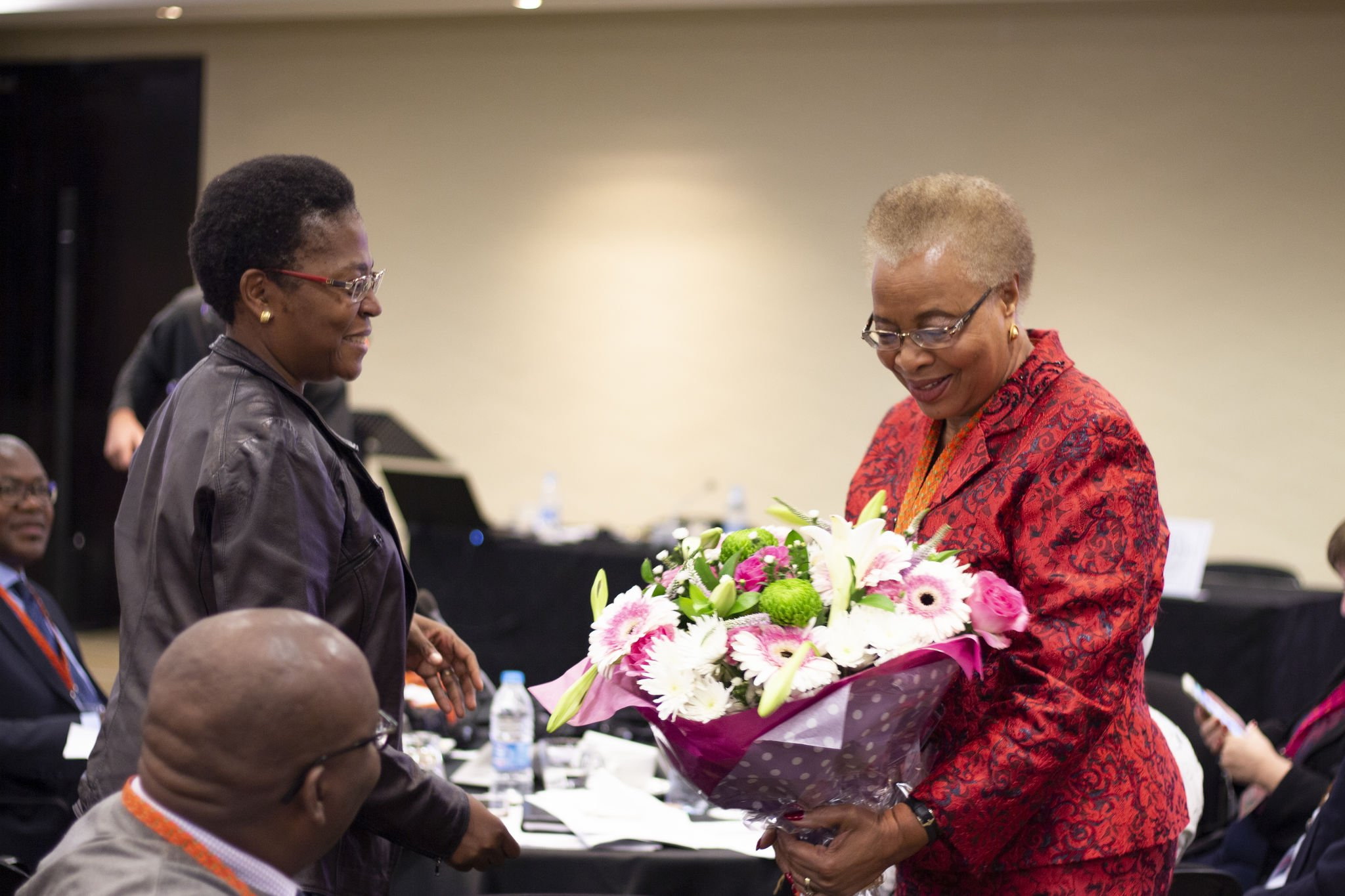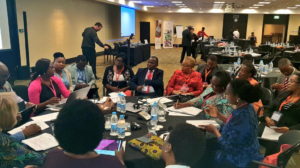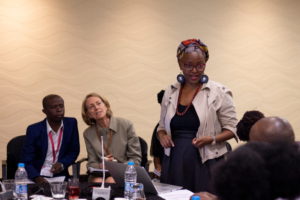
On 28-29 March, the Graça Machel Trust (GMT) partnered with Finmark Trust to hold a workshop on gender and financial inclusion. The workshop arose out of a decision of the Southern Africa Development Community (SADC) Financial Inclusion Forum for a regional workshop to focus on factors and barriers to women’s financial inclusion. Sub-Saharan Africa is ranked third in the world in the gender gap on financial inclusion. While member states are making progress on financial inclusion, more efforts are required to address gender disparities in this sector.
GMT’s partnership was anchored on its practical experiences with New Faces New Voices (NFNV) Women In Finance, our research on financial inclusion and women entrepreneurs and our process of securing financing and loans for entrepreneurs participating in the African Food Basket. The workshop attracted representation from SADC member states with a mixed delegation of officials from government, central banks, and the private sector.
Notably, the Deputy Governor of the Bank of Zambia, Dr. Tukiya Kankasa-Mabula a renowned champion of women’s financial inclusion in the SADC region, presented the key note address at the workshop on Zambia’s 10 year journey towards in women’s financial inclusion. She recognized leadership has been key and that together with her Governor, a He4She Champion, they put in place a five Point Plan and led many precedent setting transformation. They have institutionalized gender mainstreaming at the bank to educate on gender equality and these processes have enabled more women in leadership positions. They are working with the Global Banking Alliance banks in Zambia to train financial institutions and promote the use of the ILO Famos self-audits tool for banks to assess their service provision to women. They have also pioneered innovation and legislation allowing for women to present alternative forms of collateral.
Mrs Graça Machel’s address echoed on supporting women’s greater participation in the formal economy, she emphasized that women need to have a financial identity which at a basic level means for them to have a bank account. She challenged SADC member states to work cohesively to close the gender gap and to have clear targets to achieve. With the regional and some national financial inclusion strategies in place, it is important to have reliable updated data to track the progress on implementation.
She relayed the history of NFNV and the innovative work being championed by its national chapters since the inception of the network in 2009. She also alluded to the strides our newer networks such as the Network of African Business Women (NABW) and African Women in Agribusiness (AWAB) are making in building women’s entrepreneurial capacity and their access to markets and finance through the Women Creating Wealth and African food Basket programmes.

AWAB Malawi together with partner Shared Interest, shared lessons from their experience in preparing and eventually securing a group loan for seven entrepreneurs involved in the African Food Basket Project. From them we learnt that it is equally important to focus on the supply side as well as the demand side of women’s financing options. That as much as thorough preparation is required on the part of women, banks and lenders also need to change their perceptions of women as risky and to also permit alternative forms of collateral for women. Shared Interest, a guarantee funder provided 75% of collateral in support of the entrepreneurs’ loan application.
Our presenters shared that it took great effort and countless attempts, some of which were unsuccessful. This requires perseverance and in the words of Ms Martha Nkhoma of AWAB Malawi: “A quitter never wins and a winner never quits”. This is the kind of attitude required to dismantle and challenge the biases against women with regards to the financial sector. By using test cases like AWAB Malawi and the African Food Basket, we slowly begin to remove the institutional and behavioural barriers that prevent women’s access to finance.

The workshop was also alerted to new ideas to not only address women’s short-term needs, but also their long-term financial stability; specifically looking at women’s access to pensions, investments for security in old age and retirement, as well as the sustainability of their businesses.
Read more on our Women’s Economic and Social Advancement programme










 The Trust supports and mobilises civil society networks on issues of ending child marriage, ending violence against children, ending female genital mutilation and promoting children’s rights, to carry out advocacy and action across Africa. Special focus is placed on Malawi, Mozambique, Tanzania and Zambia where child marriage continues to be a problem largely driven by poverty, gender inequality, harmful traditional practices, conflict, low levels of literacy, limited opportunities for girls and weak or non-existent protective and preventive legal frameworks.
The Trust supports and mobilises civil society networks on issues of ending child marriage, ending violence against children, ending female genital mutilation and promoting children’s rights, to carry out advocacy and action across Africa. Special focus is placed on Malawi, Mozambique, Tanzania and Zambia where child marriage continues to be a problem largely driven by poverty, gender inequality, harmful traditional practices, conflict, low levels of literacy, limited opportunities for girls and weak or non-existent protective and preventive legal frameworks.




 Education is a fundamental right for all children, which is also a vehicle for social, economic and political transformation in communities, countries and the African continent at large. Recent studies indicate a lack of progress in some of the critical commitments aimed at improving education quality, access, retention and achievement, particularly for girls. In most African countries, girls may face barriers to learning, especially when they reach post-primary levels of education. By implementing multi-dimensional approaches to education which includes core education, personal development, life skills and economic competencies, the Trust partners with funding partners, governments, civil societies and the private sector to improve education access.
Education is a fundamental right for all children, which is also a vehicle for social, economic and political transformation in communities, countries and the African continent at large. Recent studies indicate a lack of progress in some of the critical commitments aimed at improving education quality, access, retention and achievement, particularly for girls. In most African countries, girls may face barriers to learning, especially when they reach post-primary levels of education. By implementing multi-dimensional approaches to education which includes core education, personal development, life skills and economic competencies, the Trust partners with funding partners, governments, civil societies and the private sector to improve education access.

 The Nutrition and Reproductive, Maternal, New-born, Child and Adolescent Health and Nutrition, (RMNCAH+N) of the Children’s Rights and Development Programme aims at promoting the Global Strategy for women, children and adolescents’ health within the Sustainable Development Goals (SDG) agenda. The strategy emphasises on the importance of effective country leadership as a common factor across countries making progress in improving the health of women, children and adolescents.
The Nutrition and Reproductive, Maternal, New-born, Child and Adolescent Health and Nutrition, (RMNCAH+N) of the Children’s Rights and Development Programme aims at promoting the Global Strategy for women, children and adolescents’ health within the Sustainable Development Goals (SDG) agenda. The strategy emphasises on the importance of effective country leadership as a common factor across countries making progress in improving the health of women, children and adolescents. Through its Early Childhood Development (ECD) plan, The Trust will seek to put into action the new science and evidence Report that was presented by Lancet Series on Good and early development – the right of every child. This will be achieved by mobilising like-minded partners to contribute in the new science and evidence to reach all young children with ECD. The Trust’s goal is to be a catalyst for doing things differently, in particular, to rid fragmentation and lack of coordination across ECD sectors. In response to evidence showing the importance of political will in turning the tide against the current poor access and quality of ECD. Even before conception, starting with a mother’s health and social economic conditions, the early years of a child’s life form a fundamental foundation that determines whether a child will survive and thrive optimally.
Through its Early Childhood Development (ECD) plan, The Trust will seek to put into action the new science and evidence Report that was presented by Lancet Series on Good and early development – the right of every child. This will be achieved by mobilising like-minded partners to contribute in the new science and evidence to reach all young children with ECD. The Trust’s goal is to be a catalyst for doing things differently, in particular, to rid fragmentation and lack of coordination across ECD sectors. In response to evidence showing the importance of political will in turning the tide against the current poor access and quality of ECD. Even before conception, starting with a mother’s health and social economic conditions, the early years of a child’s life form a fundamental foundation that determines whether a child will survive and thrive optimally.